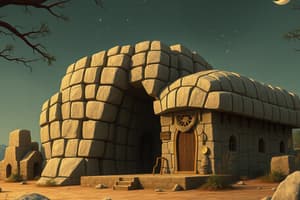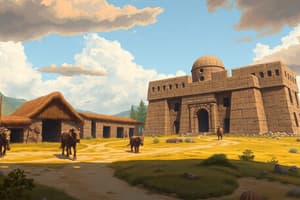Podcast
Questions and Answers
What is the approximate time span of the Middle Stone Age?
What is the approximate time span of the Middle Stone Age?
- 2.5 million to 1 million years ago
- 1 million to 6,000 BC (correct)
- 3000 BC to 8000 BC
- 10,000 BC to 3,000 BC
Which materials were used for making tools during the prehistoric period?
Which materials were used for making tools during the prehistoric period?
- Concrete and clay
- Glass and steel
- Bone, wood, and horn (correct)
- Only metal and plastic
What is a significant feature of Homo sapiens during the later phases of the Stone Age?
What is a significant feature of Homo sapiens during the later phases of the Stone Age?
- They hunted only in groups of ten or more.
- They only lived in caves.
- They primarily used metal tools.
- They began to create sophisticated tools. (correct)
What marks the beginning of the Stone Age period?
What marks the beginning of the Stone Age period?
What type of species existed from approximately 2.5 million to 1.5 million years ago?
What type of species existed from approximately 2.5 million to 1.5 million years ago?
Which characteristic describes the early phase of the Stone Age?
Which characteristic describes the early phase of the Stone Age?
What was primarily used for crafting tools in the later periods of the Stone Age?
What was primarily used for crafting tools in the later periods of the Stone Age?
How long ago did Homo sapiens live during the Stone Age?
How long ago did Homo sapiens live during the Stone Age?
What is the time frame in which early hominids are considered to have existed?
What is the time frame in which early hominids are considered to have existed?
What does the term 'prehistory' refer to in the context of human history?
What does the term 'prehistory' refer to in the context of human history?
Which of the following describes the primary method of obtaining food in a foraging society?
Which of the following describes the primary method of obtaining food in a foraging society?
What does the study of excavation sites help to analyze?
What does the study of excavation sites help to analyze?
What is one role of a person studying human history?
What is one role of a person studying human history?
What is a key feature of societies that rely heavily on agriculture?
What is a key feature of societies that rely heavily on agriculture?
What aspect of climate is most often considered when studying societal food acquisition?
What aspect of climate is most often considered when studying societal food acquisition?
Which of the following species is most closely associated with early hominids?
Which of the following species is most closely associated with early hominids?
Who discovered Lucy's remains?
Who discovered Lucy's remains?
In which year was the nearly complete skeleton of 'Turkana Boy' found?
In which year was the nearly complete skeleton of 'Turkana Boy' found?
What significant climatic change influenced early human migration?
What significant climatic change influenced early human migration?
What nickname was given to the remains found by Richard Leakey in 1984?
What nickname was given to the remains found by Richard Leakey in 1984?
Which famous song was played repeatedly during the celebration of Lucy's discovery?
Which famous song was played repeatedly during the celebration of Lucy's discovery?
Who were the parents of Richard Leakey?
Who were the parents of Richard Leakey?
What was one of the primary roles of women in early human societies?
What was one of the primary roles of women in early human societies?
Where did Lucy's remains get discovered?
Where did Lucy's remains get discovered?
Who discovered the remains of Lucy in 1974?
Who discovered the remains of Lucy in 1974?
What tool did early humans use for hunting?
What tool did early humans use for hunting?
Which species was identified from the fossil known as Lucy?
Which species was identified from the fossil known as Lucy?
What was the primary focus of the Leakey family in their explorations?
What was the primary focus of the Leakey family in their explorations?
What is the significance of the Turkana Boy fossil discovered in 1984?
What is the significance of the Turkana Boy fossil discovered in 1984?
What does the term 'hominids' refer to in this context?
What does the term 'hominids' refer to in this context?
What best describes the lifestyle of hunter-gatherers?
What best describes the lifestyle of hunter-gatherers?
Which stage of human development is referred to as 'Homo Erectus'?
Which stage of human development is referred to as 'Homo Erectus'?
What vital resource did fire provide for early humans?
What vital resource did fire provide for early humans?
How many people typically made up hunter-gatherer bands?
How many people typically made up hunter-gatherer bands?
Which material was first used to make tips for spears by hunter-gatherers?
Which material was first used to make tips for spears by hunter-gatherers?
What is the role of an anthropologist?
What is the role of an anthropologist?
What is the primary objective of archaeology?
What is the primary objective of archaeology?
Who were the parents of Richard Leakey, known for his discovery in 1984?
Who were the parents of Richard Leakey, known for his discovery in 1984?
What song inspired the name of the fossil Lucy?
What song inspired the name of the fossil Lucy?
What are cave paintings thought to represent?
What are cave paintings thought to represent?
Flashcards are hidden until you start studying
Study Notes
Prehistoric Periods
- The Stone Age is divided into three phases: Early, Middle, and Late.
- Lasted approximately 2.5 million years, with the use of stone tools dating back to 3,000 BC to 6,000 BC.
- Early humans, such as Homo sapiens, coexisted with various hominids, including Homo erectus and Homo habilis.
Hominids and Their Evolution
- Hominids walked upright and were the earliest ancestors of modern humans.
- Homo habilis existed 2.5 million to 1.5 million years ago; known for using stone tools.
- Homo erectus emerged between 1.6 million to 250,000 years ago; characterized by upright stature and migration from Africa.
- Homo sapiens, modern and intelligent humans, have been present since approximately 400,000 BC.
Archaeological Discoveries
- Significant archaeological discoveries in East Africa include the fossil known as "Lucy," found in 1974 by Donald Johanson and Tom Gray in Ethiopia.
- Lucy is the most complete hominin skeleton discovered and has greatly influenced the understanding of human evolution.
- Richard Leakey, son of Louis and Mary Leakey, discovered a nearly complete skeleton of a Homo erectus boy, nicknamed "Turkana Boy," in 1984.
Lifestyle of Hunter-Gatherers
- Hunter-gatherers, existing over two million years ago, were nomadic and followed animal migrations for hunting.
- Organized in small bands of 20-50 individuals, they relied on extensive knowledge of plants for survival.
- Men primarily hunted, while women and children gathered berries, fruits, and nuts.
- Tools such as spears, wooden tips transitioned to stone tips for effective hunting and fishing.
Tools and Communication
- Fire was crucial for warmth, cooking, and protection from predators.
- Cave paintings served as some of the earliest forms of communication, often depicting hunting scenes.
- Tools were made from animal bones, wood, and stone, showcasing early human ingenuity.
Role of Anthropology and Archaeology
- Archaeology studies ancient artifacts and remains to uncover prehistoric human life.
- Anthropologists focus on human societies and developmental processes over time.
- Louis and Mary Leakey were pivotal archaeologists who explored across various countries in Africa, contributing to the understanding of human ancestry.
Environmental Impact on Migration
- Changes in climate, like melting glaciers, influenced early humans to migrate to new regions for resources.
Studying That Suits You
Use AI to generate personalized quizzes and flashcards to suit your learning preferences.




